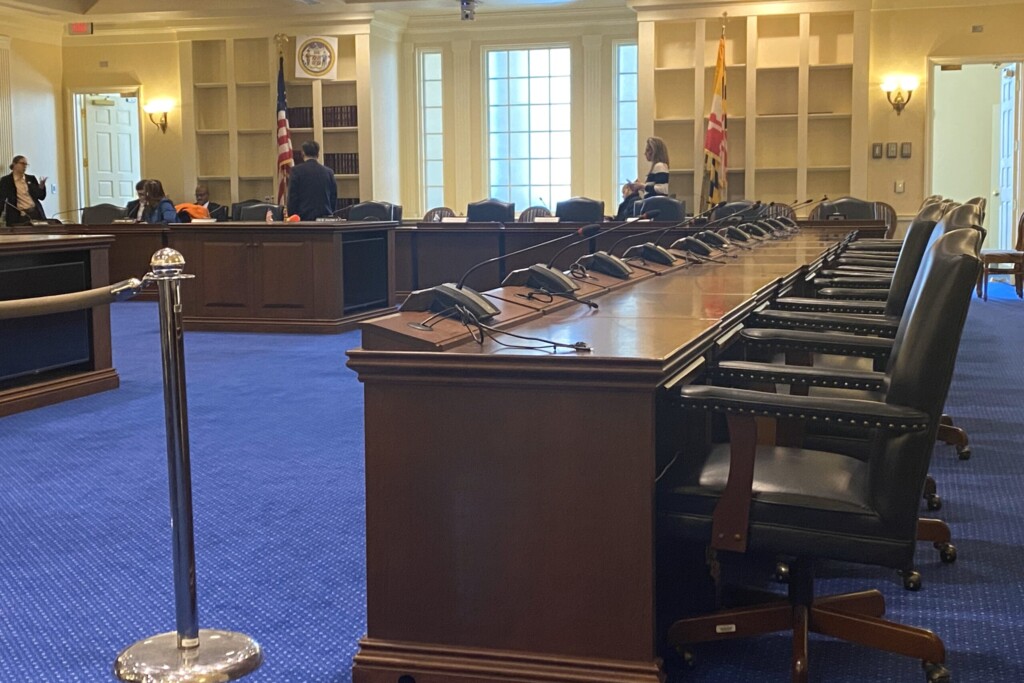This article was republished with permission from WTOP’s news partners at Maryland Matters. Sign up for Maryland Matters’ free email subscription today.

This content was republished with permission from WTOP’s news partners at Maryland Matters. Sign up for Maryland Matters’ free email subscription today.
A showdown between the House and Senate chambers over education funding intensified Thursday when House budget negotiators showed up for an afternoon meeting, while senators stayed in place across the street.
The Budget and Taxation Committee remained in a voting session in the Miller Senate Office Building as legislative staffers, administration officials and advocates crowded the House Appropriations Committee room, where earlier budget negotiations had been held.
While an initial meeting of the budget conference committee on Tuesday resulted in the swift resolution of dozens of minor differences between versions of the state budget passed by the House and Senate, just a handful of issues were left to be ironed out Thursday.
One of them was a perennial debate over a tiny sliver of the state’s $63 billion budget — funding for the Broadening Options and Opportunities for Students Today, or BOOST, program, which provides money for low-income students to attend private schools.
While the House’s budget plan phased out BOOST — as House spending plans have for several years — a Senate budget amendment added $2 million to the program. In January, Gov. Wes Moore (D) released a budget that reduced the program’s allocation from $10 million annually to $8 million and phased out the existence of the program in future years.
One hour and four minutes after the committee’s scheduled start time, House Appropriations Chair Ben Barnes (D-Prince George’s and Anne Arundel) addressed the crowd that had gathered in his committee room.
“Sorry for the delay everyone. The Senate finished voting about a half-hour ago and we were trying to give them every opportunity to come to conference today. …The House is here ready to work out any differences,” Barnes said.
“This entire session, the House has made public education its priority,” he added.
If their Senate counterparts had shown up, House negotiators had planned to introduce two new budget solutions for education funding during Thursday’s meeting, Barnes said. The first would have shifted an additional $100 million to the Blueprint for Maryland’s Future Trust Fund. The other would have moved the disputed $2 million for BOOST funding to provide grants to local school districts for Blueprint grant coordinators.
During the seeming impasse at the House building, the third floor outside Senate committee rooms was mostly quiet, save for lawmakers and staff occasionally coming and going with wares to set up the committees’ annual dinners later that evening.
Budget & Taxation Committee Chair Guy Guzzone (D-Howard) said later that a firm meeting time with House negotiators had never been set for Thrusday, and that he had been in regular conversation with Barnes during the day.
Guzzone did not say how he planned to respond to the House’s new proposals, but expressed optimism that a compromise between the chambers can still be reached.
“I think reasonable minds will come together eventually. …There are very heartfelt positions on both sides, caring about children’s education,” Guzzone said. “It’s reasonable to feel strongly about these things.”
The chambers are up against a deadline to pass a budget by Monday, the 83rd day of session. If the deadline is passed, the governor will issue a proclamation extending the budget portion of the session to Day 90, the last day of the regular legislative session.
The House and Senate versions of the budget already included a $100 million gap in allocation to the Blueprint Fund, which is meant to serve as a savings account ahead of massive increases in state public education funding over the next decade.
Moore included $500 million for the fund in his initial budget proposal in January. The House added an additional $400 million when the budget passed that chamber earlier this month, for a total of $900 million in future education investments.
The Senate scaled that back by $100 million to $800 million when it passed its version of the budget a week later.
“We know we’re facing a serious Blueprint shortfall in the outyears,” Barnes said Thursday.
The Blueprint Fund was projected to have a $2.2 billion surplus at the end of Moore’s Fiscal 2024 budget, but would have a near-zero balance in the 2026 fiscal year and run into deficit in 2027, according to early budget analyses.
The additional $100 million Blueprint investment now proposed by the House, which would bring the total influx to $1 billion, would come from a reduction in overpayment to the state’s pension plan ($12 million) and $88 million from the Maryland Stadium Authority’s Racing and Community Development Financing Fund.
That fund is the subject of one of the only other outstanding budget provisions, as leaders from both chambers seek to force movement on a stalled three-year-old plan to invest at least $375 million into redevelopment of Maryland’s horse racing tracks and Pimlico and Laurel Park.







